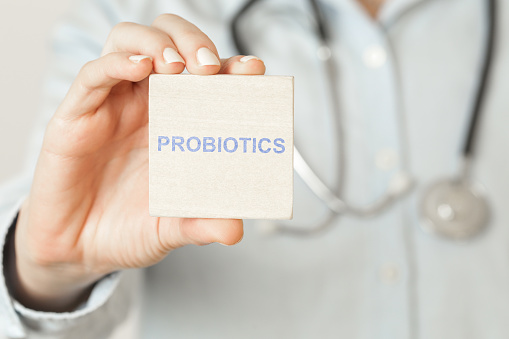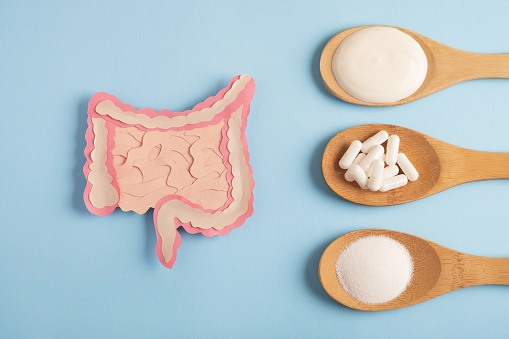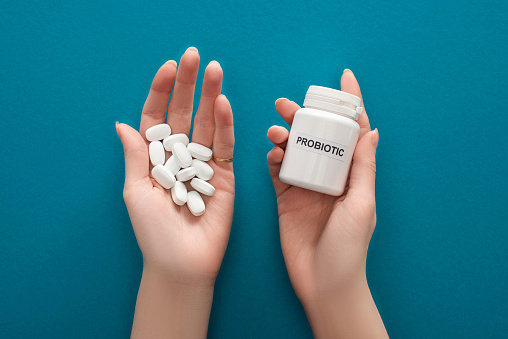Probiotics, which are live bacteria or yeasts present in the human body and in some cultured foods, aid in maintaining digestive health. However, they are susceptible to medications, dietary changes, and infection, all of which may kill them.
It is possible that the effects of taking supplemental probiotics will vary depending on the kind used. Some Lactobacillus strains are better at preventing disease than others. Just because a certain strain of probiotics has a certain effect doesn’t indicate that other strains will have the same, so it is crucial to do research beforehand.
An essential part of your body’s microbiome is the community of microorganisms (such as bacteria, fungus, viruses, and protozoa) that probiotics help create in your digestive tract. So, having a healthy amount of probiotics is a precursor to a healthy balance of beneficial gut bacteria in the body.
Probiotics are referred to as “friendly or healthy bacteria” and “good gut bacteria” in the medical community. Not all bacteria cause disease. Probiotics are microorganisms that reside in the human body and assist in maintaining a healthy digestive system, as well as protect the body from disease.
There are tons of types of probiotics that you can use. Most frequently, these probiotics are taken as follows:
- Lactobacillus acidophilus (L. acidophilus)
It is a kind of bacterium that produces lactic acid by degrading carbohydrates into their parts. There is a high concentration of lactobacillus acidophilus in yogurt and other fermented foods.
This is one of the best probiotic supplement that helps alleviate diarrhea brought on by oral antibiotics, while other strains may be helpful in treating vaginal yeast infections.
- Bifidobacterium
This group of microorganisms has been shown to alleviate symptoms of irritable bowel syndrome (IBS) and other gastrointestinal diseases, including those that cause diarrhea and constipation.
- Saccharomyces Boulardii
Yeast, by its more common name, is a microbe with the potential to aid in treating diarrhea and other digestive disorders.
In order to alleviate constipation, probiotics are commonly prescribed to help restore the balance of gut flora. This will regulate bowel movements, and help you move away from the extremes of diarrhea and constipation. Some experts recommend using Bifidobacterium-based probiotic supplements to relieve constipation.
Renowned research formulated that probiotics aid in softening and facilitating the passage of feces. There was also an increase in bowel motions per week and a decrease in “gut transit time.”
Many people take probiotics not just to aid with bowel movement but also to alleviate symptoms such as gas and bloating. As an extra precaution, you may consider taking probiotics with your antibiotics to avoid diarrhea that may occur as a side effect.
What Are Adverse Effects Of Probiotics?
Most individuals do not have any difficulties when taking probiotics; nevertheless, some do. After taking this medication, many consumers experience a short-term rise in digestive gas, bloating, and thirst.
Certain individuals may be more susceptible to unpleasant responses to the compounds included in probiotic supplements or the naturally occurring amines found in probiotic foods. When you come across such a situation, the recommendation is to take a rest.
Probiotics can have a number of minor adverse side effects, some of which are listed here.
-
Unpleasant Digestive Symptoms
Most individuals don’t suffer any adverse effects, yet a typical reaction to such probiotic supplements with bacterial composition is an increment in bloating.
As a result of taking probiotics derived from yeast, some people may develop constipation and an increase in water consumption.
It’s unclear why some people suffer these adverse effects, but they usually disappear after a few weeks of regular treatment.
Start with a modest dose of probiotics and gradually raise the overall dosage over a few weeks to minimize the risk of negative effects. It can aid your body in adjusting to them.
Stop taking the probiotic and see a doctor if the symptoms of gas, bloating, or other discomforts persist for more than a few weeks.
-
Amines Can Trigger Headaches
These foods, including yogurt and sauerkraut, are rich in biogenic amines. A compound known as a biogenic amine is formed when protein-rich foods such as meat are aged or fermented.
Histamine, tryptamine, tyramine, phenylethylamine, etc., are some of the most frequent amines found in diets high in probiotics and prebiotics. Those who are hypersensitive to amines may get headaches as a result of the stimulatory effects of the chemical.
Seventy-five percent of people in one research reported fewer headaches after following a low-histamine diet. According to 10 controlled trials reviewed, dietary amines had no meaningful influence on headache symptoms.
If amines cause headaches and migraines in certain people, more research is needed to find out. You may find out if fermented foods cause you headaches by keeping a food diary and noting any symptoms you encounter.
A probiotic supplement may be better if probiotic-rich meals aggravate your symptoms.
-
High Histamine Levels
Probiotic supplements may include microorganisms that generate histamine in the human digestive tract. It’s normal for your immune system to create histamine to react to any perceived danger to the body.
More blood is pumped to the afflicted region when histamine levels rise. Vascular permeability improves, allowing immune cells to reach and combat infections rapidly. You might trigger allergy signs such as itching, watery eyes, sneezing, runny nose, or breathing problems due to this process.
Diamine oxidase is the enzyme carrying out this process (DAO). DAO is an enzyme that splits down histamine during digestion. Histamine levels are prevented from escalating to the point of causing symptoms by this enzyme.
A lack of DAO in some persons with histamine sensitivity makes it difficult for their systems to break down the histamine adequately.
It then enters circulation, creating allergy-like symptoms as histamine travels through the gut lining and into the bloodstream. It is suggested that people with histamine sensitivity should avoid foods high in histamine.
In theory, you may wish to look for probiotic supplements that don’t include histamine-producing bacteria, but no studies have been done in this area.
Lactobacillus buchneri, Lactobacillus helveticus, Lactobacillus hilgardii, and Streptococcus thermophilus are examples of histamine-producing probiotic bacteria.
-
Negative Impact Of The Composition
Individuals with allergies or sensitivities should carefully examine probiotic supplements’ labels since they may include components to which they are allergic or intolerant. For example, dairy, egg, and soy are common allergies in several dietary supplements.
Individuals with sensitivity to certain components that can trigger their allergies should avoid them. If you must, make sure to read labels carefully to prevent them. For the same reason, those who are allergic to yeast should avoid taking any probiotics that include yeast. Instead, they should utilize a probiotic supplement derived from other helpful gut bacteria.
Lactose, or milk sugar, is a common ingredient in probiotic supplements. Despite research showing that most lactose intolerant patients can take up to 400 mg of lactose in drugs or supplements, there have been instances of severe reactions from probiotics.
Some patients may choose lactose-free probiotics to avoid gas and bloat caused by lactose sensitivity.
Synbiotics that contain both probiotics and prebiotics may also be preferred. Bacteria may feed on the prebiotic plant fibers since humans cannot digest them. Lactulose, inulin, and a variety of oligosaccharides are the most prevalent forms found in food.
People who take synbiotics may occasionally bloat. Some people may prefer a supplement without prebiotics if they are bothered by these negative effects. However, probiotics can still sometimes cause bloating as well.
-
Elevate Infection Risk
Probiotics are safe for the vast majority of people. However, they can act opposite for some people and cause ailments. In very rare cases, the bacterial composition or probiotic yeast can enter your circulatory system, inducing sickness in vulnerable people.
People with impaired immune systems, extensive hospital stays, venous catheters, or recent surgery are at the greatest risk of infection from probiotics.
However, the risk of this happening is very low, and no serious infections have been documented in clinical investigations of the general population.
It is expected that only approximately one in a million people who take probiotics containing Lactobacilli bacteria will become infected. The danger is significantly lower with yeast-based probiotics, with just around one in every 5.6 million affected consumers.
If such an infection emerges, it will usually respond well to standard antibiotics or antifungals. However, fatalities have happened in a few instances. According to research, those with powerful acute pancreatitis should avoid probiotics, which may raise mortality risk.
Are Probiotic Supplements Necessary?
Probiotics have been studied extensively, but there is always room to learn. We must explore it further to understand their efficiency and safety for various health issues.
Probiotics have shown potential in various health applications, including antibiotic-associated diarrhea prevention.
Yes, probiotics supplements may be necessary depending on the nature of the ailment. A specific strain of probiotic, colostrum, is widely used in treating premature newborns. It also treats baby colic, treats gum disease, and helps ulcer patients achieve or maintain remission.
However, we still don’t know which probiotics are the most beneficial in most cases. The proper dosages of probiotics for each type of treatment have also not yet been determined. Even for the most researched illnesses, experts are still exploring tackling the problem with care.
Unless your doctor specifically advises you, you don’t need to take probiotics. You shouldn’t need probiotic pills if you follow a healthy diet and have regular bowel movements.
Probiotics contained in meals and supplements have long been thought to enhance digestive health since the majority of probiotics in the body reside in the gastrointestinal tract.
If we consider the use of prebiotics, the following are some of the health complications where you can find them both practical and effective.
-
Antibiotic-Associated Diarrhea
Studies on the use of probiotics to treat antibiotic-associated diarrhea in general and diarrhea caused by Clostridium difficile in particular have been conducted. The bacterium Clostridium difficile is the subject of a subsequent section.
A 2017 research on persons who were not hospitalized found that probiotics and antibiotics can reduce the risk of antibiotic-associated diarrhea by roughly half. However, the quality of the research used to draw this conclusion was only moderate. Patients who received probiotics had no greater adverse effects than those who did not.
The use of probiotics in treating antibiotic-associated diarrhea in children and adults seems promising. Despite this, a 2016 evaluation of 30 trials found no advantage for the elderly, and five of those studies focused on those over 65. If probiotics don’t function in older individuals, or if no benefit was observed due to a lack of research in this age group, it’s difficult to be certain of the effects.
Some data suggest that probiotics may help protect children against antibiotic-associated diarrhea when taken orally in small doses. Children who were otherwise healthy and receiving treatment for an illness had no negative side effects.
-
Constipation
Bifidobacterium lactis was shown to be particularly beneficial in a 2014 review of trials on probiotics and constipation in adults.
Probiotics may have a tiny but important impact on older people’s constipation, according to a 2017 assessment of probiotics. It was Bifidobacterium longum that was most often tested. According to the study’s authors, probiotics may be an effective supplement to traditional therapies for treating persistent constipation in older adults.
There was also a review of studies on probiotics for children’s constipation. The trials were difficult to compare because of the different groups of children tested, the types of probiotics employed, and other variables. Any probiotics tested on children were found to be useless by the reviewers.
Experts provided a more hopeful assessment of the data in a 2017 follow-up study that included two more studies in addition to the original batch. Children from Asia and Europe showed a greater response to probiotics than Europeans.
-
Inflammatory Bowel Disease
Several diseases in the inflammatory bowel group cause inflammation in the digestive tract. Due to inflammatory bowel disease, individuals can experience ulcerative colitis and Crohn’s disease more often.
Thus, abdominal discomfort, diarrhea with blood, no hunger, muscle loss, and high temperature are all possible side effects of a bacterial infection. Symptoms might be moderate or severe and may come and go at any time. Medications and, in rare situations, surgery are used as part of the treatment.
Adding probiotics, prebiotics, or synbiotics to standard medication may help patients with ulcerative colitis achieve and maintain remission, according to one research. The same review found no evidence that Crohn’s disease patients benefited from probiotics, prebiotics, or synbiotics.
-
Irritable Bowel Syndrome
Irritable bowel syndrome, or IBS, is a condition that frequently leverages inside the large intestine. Indicators and signs are muscle cramps, stomachache, bloating, and abdominal discomfort like constipation. IBS is a chronic ailment that requires constant treatment and management on the part of the patient.
In 2018, a number of studies that investigated the effects of probiotics on irritable bowel syndrome (IBS) came to the conclusion that probiotics may have considerable benefits for people experiencing IBS symptoms and abdominal pain worldwide.
However, the study did not produce any conclusive results concerning the utility of probiotics or establish which species, subspecies, or combinations of probiotics are most effective for IBS. Neither of these things was possible in the limited study performed. As more studies in this field are carried out, we hope to know more about this highly-beneficial supplement.
-
Traveler’s Diarrhea
There is some evidence that probiotics and prebiotics may be effective in preventing traveler’s diarrhea, according to an assessment conducted in 2018. On the other hand, the review did not evaluate the quality of the studies and did not include any information about adverse effects.
According to a clinical practice recommendation released in 2017 by the International Society of Travel Medicine, not much evidence exists backing up the use of probiotics for treating traveler’s diarrhea. The suggestions considered the presence of data pointing to relatively small benefits.
However, they did point out that there is a significant amount of difference across studies in terms of the probiotic strains that were used, the factors that led to diarrhea, and the locations of the trials. In addition to this, the methodology utilized in particular studies was incorrect.
-
Dental Caries Or Tooth Decay Cure
A modest study, conducted only on newborns and young children, has studied the idea that probiotics can potentially prevent tooth decay. A meta-analysis of many trials revealed that the usage of probiotics was related to fewer cavities in most studies. However, because of the poor quality of the information, no definitive conclusions could be drawn regarding the use of probiotics.
-
Infant Colic
Colic is excessive and inexplicable newborn crying. Babies with colic may cry for three hours a day, yet they feed well and develop properly. It is not entirely known what causes colic. Studies have revealed changes in the microbial population of the digestive system in babies with colic compared to those without, suggesting that microbes may play a role.
Numerous research on probiotics for colic was conducted in 2018. Some of them discovered a correlation between this probiotic and therapy success. This medication reduces crying by more than half daily. However, probiotics showed an impact predominantly in exclusively breastfed babies.
In the second evaluation of a small number of research on colic, which included recurrent physical examinations and blood testing on infants with colic, no adverse effects were seen. The probiotic was administered, and data was collected from parental reports. In many cases, the treatment had a positive effect, and had no side effects. Therefore, prebiotics as a newborn colic treatment is definitely worth a shot.
5 Probiotic-Rich Foods To Eat
Additionally, several foods contain probiotics and can be incorporated into your daily diet. It is possible to boost the number of beneficial bacteria found in your body by eating certain probiotic foods more often. You can consume probiotic-rich foods to enhance your gut health. These wholesome foods include probiotics:
- Whole grains
- Fresh fruits and green vegetables
- Cereals like beans and legumes
- Dairy products like yogurt
- fermented foods like kimchi, sauerkraut, etc.
Prebiotics are the main source of nutrition for beneficial bacteria in the digestive tract and throughout the body. There are several forms of prebiotics, but the vast majority are complex carbohydrates called oligosaccharide carbohydrates (OSCs).
Many individuals who take probiotics may also be instructed to take a prebiotic dose. According to the available evidence, prebiotics may benefit the gastrointestinal, central neurological, and cardiovascular systems.
It is important to remember not to use probiotics as an excuse to delay visiting a doctor about any gut health issue. If you’re contemplating taking a probiotic dietary supplement, you should first visit your doctor. Any sign of health problems should be taken seriously. While taking probiotics, anyone with a significant underlying health condition should be continuously monitored.
Take responsibility for your health; discuss any complementary health techniques you utilize with your health care professionals. This way, you can make a well-informed and reliable decision for your health.
What Are The Risks Of Taking Probiotics?
Probiotics have a long history of use and have been characterized as safe, particularly if you are in good health. As a result of the limited number of studies that have been conducted to investigate the safety of probiotics in depth, there is a dearth of reliable information on the occurrence and severity of adverse effects.
People who already have serious diseases or immune systems that aren’t functioning properly have a higher risk of adverse reactions to probiotics. When considering the use of probiotics for high-risk persons, such as preterm newborns or very ill hospital patients, it is important for a medical professional to carefully assess the possible hazards of probiotics against the advantages of using them.
For instance, probiotics can cause infections, toxicity in the body, and induction of antibiotic genes from the bacterial composition of probiotics to your body, which are some of the negativities and risks of taking probiotic supplements.
There have been reports that specific probiotic products include bacteria besides those that are specified on the product’s label. These pollutants may, under some circumstances, significantly harm one’s health.
Because these beneficial bacteria already reside in the body, it is generally agreed that consuming them would not do any harm. However, there are a few points that should be taken into account.
Probiotics have the potential to trigger an allergic response. It is possible that taking them, especially for the first few days, can cause you to experience some slight gastrointestinal issues. It’s also possible to get stomach aches, gas, diarrhea, or bloating.
After a period of time, your body will adapt to the probiotics and these symptoms will often disappear. There are also probiotics for weight loss so incase you are looking for weight loose you can consider such kind of probiotics.
Conclusion: Do Probiotics Help With Pooping?
The consumption of significant quantities of foods containing live bacteria and yeasts, known as probiotics, has been shown to affect health positively. There is a wealth of evidence pointing to the positive effects of consuming probiotic foods and supplements on a person’s health. These advantages include a reduced risk of infections, better digestion, and even a lower chance of some chronic illnesses.
Probiotics have been shown to have a number of positive impacts on health, but they can also have side effects, however rare. Most of these side effects are rather inconsequential and easily treated. On the other hand, certain patients, particularly those with more severe diseases or immune systems that are already impaired, may encounter more severe problems.
Always consult a medical professional before starting any medication or natural supplement. They will help you to properly assess the probiotics that will work best for you. Moreover, if the adverse effects continue, stopping consuming probiotics will do you no harm.








